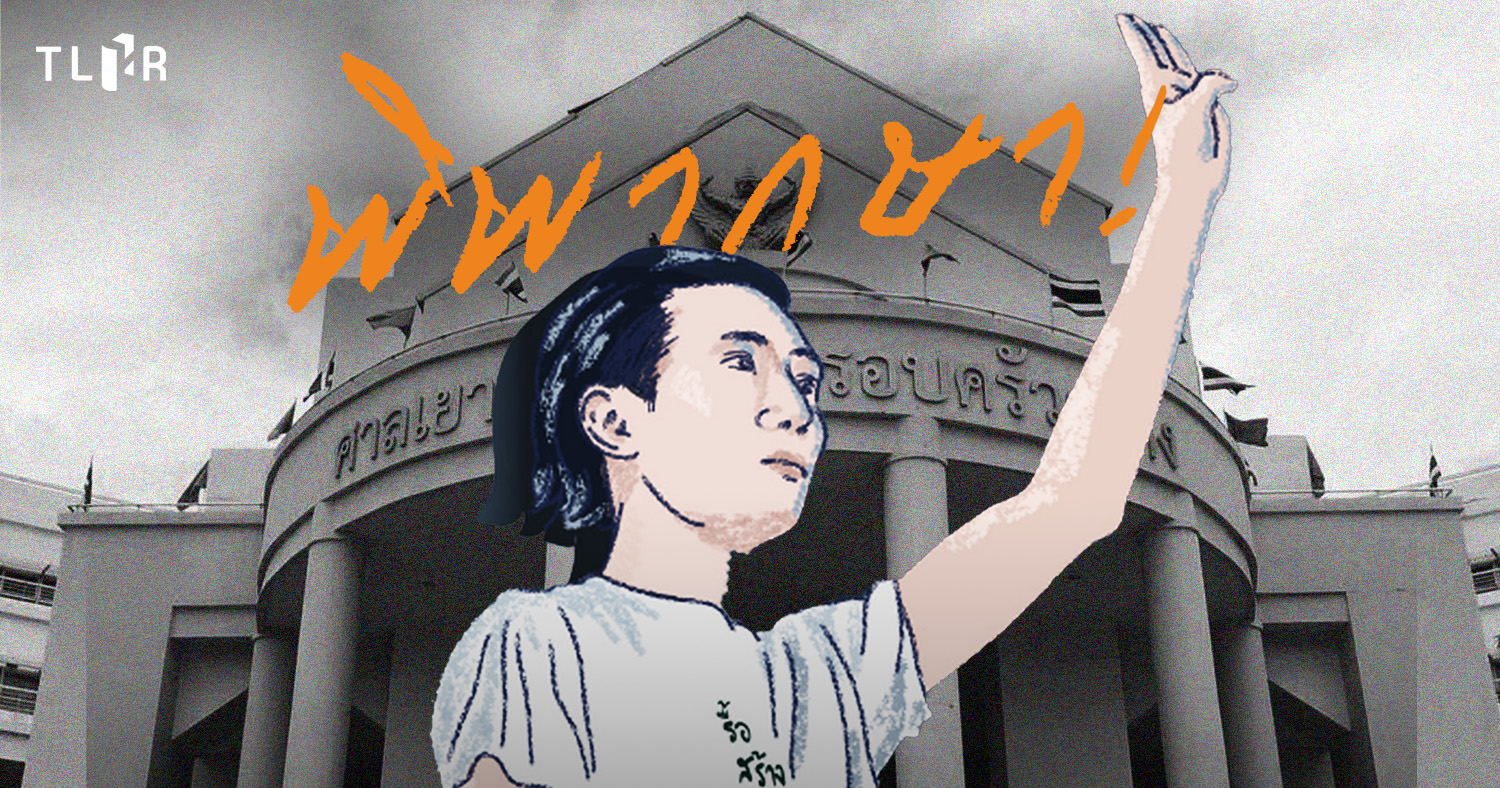A 19-year-old activist was sentenced on Tuesday (22 November) to 2 years in prison after the Central Juvenile and Family Court ruled that the royal defamation law covers not only specific monarchs but also the monarchy as a whole.

(Illustration by TLHR)
Thanakorn (last name withheld) was charged with royal defamation for a speech given at a protest on 6 December 2020, in which they said that Thailand is not a democracy but an absolute monarchy and spoke about the role of the monarchy in military coups. They also called for a national reform. At the time, Thanakorn, who identifies as being part of the LGBTQ+ community, was 17 years old.
Activists Wanwalee Thammasattaya and Chukiat Saengwong were also charged for speeches given during the same protest, but since both were over the age of 20, Wanwalee and Chukiat’s cases are being heard by the Thonburi Criminal Court.
The complaint against the three activists was filed by Chakrapong Klinkaew, leader of the royalist group People Protecting the Institution.
Thai Lawyers for Human Rights (TLHR) reported that the Central Juvenile and Family found Thanakorn guilty on the grounds that the royal defamation law coves not only specific monarchs but the entire monarchy and sentenced them to 2 years in prison. Given that they were charged at the age of 17, Thanakorn is now the first minor to be charged and convicted for royal defamation.
The court said that, since it believes it would be more beneficial for Thanakorn to go through “training” to improve their behaviour than for them to go to prison, it commuted the prison sentence to a juvenile training centre under the Department of Juvenile Observation and Protection of the Ministry of Justice for a minimum of 1 year and 6 months or a maximum of 3 years, but not after they turn 24 years old.
The court prohibited representatives of human right organizations and anyone not related to the case to observe the trial, claiming that it cannot allow third-party observers because the case involved a minor. After Thanakorn told the court that they wanted trusted persons and rights groups to be present in the court room, the judge said that organizations wishing to observe the trial must request permission from the court.
However, after representatives from Amnesty International told the judge that they have already submitted a request to observe Thanakorn’s trial and presented their letter to the judge, they were told that their request is denied, claiming that Thanakorn was to be tried in secret.
Thanakorn then left the courtroom and filed a petition themself to have representatives from human rights organizations attend the trial so that they would feel safe, and said that it would be in their best interest to have observers in the room. However, their request was denied.
Following Thanakorn’s sentencing, Amnesty International issued a statement noting that at least 283 protesters under the age of 18 have been prosecuted for participating in the protests, the majority of whom were charged with violations of the Emergency Decree, which has since been repealed, while others face charges of defamation, sedition, and dissemination of false information.
The statement noted that Thailand is a state party to the International Covenant on Civil and Political Rights (ICCPR) and the Convention on the Rights of the Child (CRC), both of which guarantee children’s freedoms of expression and peaceful assembly. It said that during its Universal Period Review in 2021, Thailand received recommendations to uphold these freedoms for children and to avoid detaining or prosecuting minors who are exercising their rights. However, it also noted that the Thai government has always rejected these recommendations.
Amnesty International Thailand’s executive director Piyanut Kotsan said that Thanakorn’s sentencing sets “a worrying precedent” and creates “a chilling effect” for young people taking part in the pro-democracy movement, and while the prison sentence was commuted, Thanakorn should never have been charged to begin with, and they will still be held in official custody and take part in mandatory training for the duration of their sentence.
She noted that Thanakorn will still have a criminal record, which could affect their professional opportunities, and their sentence would deprive them of the time and resources they could use to pursue education like other young people.
“Young people peacefully expressing their opinions, views and thoughts about the future of the country should not face jail time or restrictive measures that limit their day-to-day activities. Thai authorities must stop intimidating and surveilling child protesters and end criminal proceedings against them,” Piyanut said.
Thanakorn was later granted bail in order to appeal the conviction on a security of 30,000 baht, which was covered by the Will of the People Find, a bail fund for pro-democracy protesters and activists.

